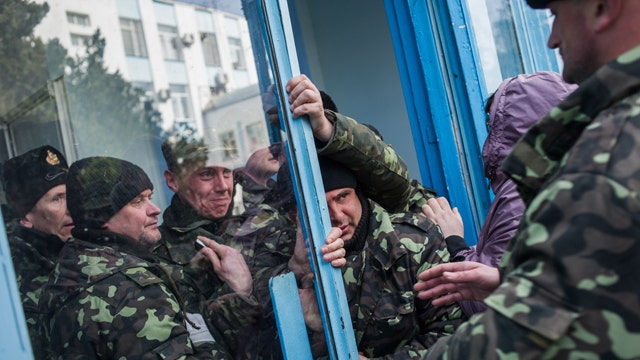WASHINGTON – Russia's advances in Ukraine are the greatest threat to European security since the Cold War, NATO's chief said Wednesday, making clear that military alliance must refocus on risks closer to home after years of fighting in faraway war zones.
"This is a wake-up call," NATO Secretary-General Anders Fogh Rasmussen told a Washington think tank.
He lambasted Moscow's annexation of Ukraine's strategic Crimean Peninsula as illegal and illegitimate, and repeated NATO's decision to suspend a joint maritime escort with Russia for the destruction of Syria's chemical weapons.
Rasmussen outlined military measures under preparation for NATO states, if needed, to respond to Russia. They include surveillance flights over Poland and Romania, and additional assets for an airspace protection mission over Estonia, Latvia and Lithuania.
"This is the gravest threat to European security and stability since the end of the Cold War," Rasmussen said in a speech at the Brookings Institution.
Developments in Ukraine, he said, "are a stark reminder that security in Europe cannot be taken for granted. ... We need to take tough decisions in view of the long-term strategic impact of Russia's aggression on our own security."
Rasmussen also mentioned other NATO priorities, including the war in Afghanistan, peacekeeping in Kosovo and stopping piracy off Somalia.
He described ending NATO combat mission in Afghanistan at year's end, and preparing for "a future relationship" with that country.
NATO has been pushing Afghanistan to sign security agreements with the U.S. and the alliance that would allow international troops to remain in Afghanistan for a training mission extending beyond Dec. 31.
Afghan President Hamid Karzai has refused, frustrating Western leaders who hope his successor will change course after presidential elections this spring.
But the advances by Russia have forced some U.S. and NATO officials to question whether European troops would be willing to continue the mission in Afghanistan if their own borders are threatened.
Rasmussen said Moscow's aggressions would not divert NATO from its mission in Afghanistan.
"We have the capacity to deal with several missions and operations at one and the same time," he said. "And ongoing events will not have any impact on our engagement in Afghanistan."





